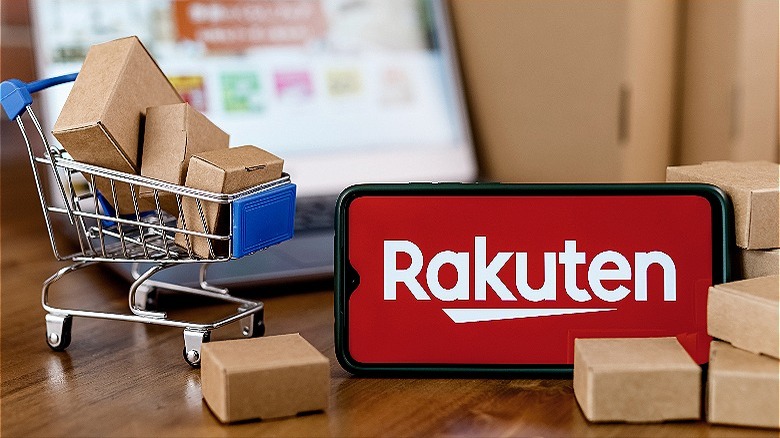How To Budget To Stay Out Of Debt After Holiday Shopping
Perhaps the worst way to kick off the new year is underneath a pile of debt from questionable holiday splurges. In a CNET Money survey, 69% of shoppers admitted that they plan to overspend this holiday season, but you don't need to be one of them.
The good news is that consumers will have a built-in advantage for the 2023 holiday shopping season. That's because COVID-era supply chain issues are finally disappearing at the same time consumer spending is beginning to weaken. According to some sources like industry analyst Ted Rossman, as reported to CNBC, "This is the best discounting season in years." Rossman continues, "Retailers are offering generous discounts to move clothes, toys, electronics, and other physical goods.
That said, shoppers still need a strategy to avoid overspending on gifts. For example, at least one financial expert mentions that consumers tend to spend more when buying gift cards than an actual physical gift, negating any potential bargains that might be available. To avoid a debt hangover in 2024, use these simple tricks.
Set a strict spending limit
According to the credit-counseling nonprofit Clearpoint, consumers should try spending no more than 1.5% of their annual income on holiday expenses. So for example, a person earning $60,000 per year shouldn't spend more than $900 on the holidays. Another guideline of how much is appropriate to spend is the 50/30/20 rule, where 50% of your income is dedicated to "needs" such as mortgage or rent payments, 30% is allocated to "wants," and the final 20% is saved or invested. In this case, holiday spending would be deducted from the "wants" bucket.
The same formula won't work for every individual because some folks might prioritize travel to visit family, while others don't plan to travel and are therefore able to spend more on gifts. If utilizing the 50/30/20 rule, how much of the 30% "wants" was already spent earlier in the year on restaurant meals, concerts, or vacations will also impact your holiday budget.
Regardless of how you determine your spending limit, the most important part is sticking with the plan. Amanda Christensen, a Utah State University Extension associate professor, recommends, "Once you've determined how much to spend ... divide the total among the people you plan to buy gifts for, the holiday food extras and any other expenses you know you will incur. Finish the spending plan before you start shopping, and keep track of spending as you go."
To that end, there are numerous apps available for iOS and Android that track holiday gift spending. Be sure to avoid impulse purchases or the temptation to stretch your budget with buy now, pay later schemes and credit cards.
Don't use credit cards without a plan
According to Bankrate, the average interest rate for credit card balances approaches 20%. That rate is far higher than other types of loans and definitely not a burden you want to be saddled with, so absolutely don't make charges to a high-interest rate credit card if you can't afford to pay the bill in full each month.
That said, when used responsibly, credit cards can be a powerful tool to earn cash back, airline miles, or other travel rewards on every holiday dollar that you spend. Taking that concept one step further, some consumers might opt to sign up for a new credit card that offers a generous bonus for meeting a minimum spending threshold in a certain amount of time. Such bonuses can often amount to $200 to $300 or more in cash or enough travel points to score multiple round-trip flights. Just don't spend more than you normally would in your haste to qualify for earning the bonus.
For shoppers who aren't strong-willed, though, it's best to stick with paying for holiday gifts with a debit card or good old-fashioned cash to avoid getting overextended. If you simply must use a credit card to pay for purchases over time, either seek out a promotional APR with your current card issuer or open a new credit card account with the provision for low- or no-interest balance transfers.
Use a cash-back shopping portal
Similar to credit cards that reward purchases with points and/or cash back, online shopping portals can save you serious money by rebating a portion of the price of an item that you were going to buy anyway. How do shopping portals work? First, shoppers need to establish a free account with an email and password at the portal's website. Then, you can search for your preferred retailer on the portal and click through to make a purchase at that store's website as usual.
The process can also be automated by downloading your preferred shopping portal's browser extension, which will track your shopping and make sure that you receive cash back for eligible purchases. Do note that not all retailers participate in these programs. Those that do will typically display a banner or icon when using the portal's browser extension. Alternatively, a list of participating retailers can be viewed at the portal's website.
Okay, so how much cash back can you expect to earn with a shopping portal? It varies by retailer and can even vary by the type of products purchased from that retailer, but anywhere from 1% up to 20% cash back is typical. Best of all, you can "double dip" by using your rewards credit card to complete the purchase, earning a reward or cash back from the credit card and cash back from the shopping portal. Periodically, the portal will deposit your rebated cash electronically or via a conventional paper check.
If you're wondering where to get started, Rakuten is the most popular shopping portal, but there's also PayPal's Honey, Ibotta, and numerous others.
Consider making something to give
Creating a bespoke, personalized gift with your own two hands is one of the most thoughtful gift-giving options that also happens to be extremely budget-friendly. For example, grandparents will love to receive a framed photo, photo album, or even a Christmas ornament adorned with images of their precious grandkids.
Of course, homemade treats like cookies or cupcakes are always a popular gift-giving option, but you can also gift a "recipe jar." Recipe jars contain the dry ingredients to make treats like cookies or hot cocoa, packaged in a cute mason jar with holiday decorations or even a festive cookie cutter. If you're a handy do-it-yourselfer, you might consider making yummy-smelling candles or knitting scarves or hats.
While homemade gifts might not be appropriate for every single person on your holiday shopping list, going that route for a handful of friends or family will stretch your gift-giving dollars. Plus, the recipient will appreciate the thought and effort involved as opposed to just grabbing a generic gift card.
Shop thrift stores or online for secondhand gifts
The thought of gifting/receiving used goods still carries a negative stigma for some folks, but it really shouldn't. There are so many benefits to giving existing goods a second life. Not only is it more budget-friendly, but it's better for the environment. Buying new things, such as clothing and furniture, generates a ton of waste and packaging that needs to be disposed of. According to the Environmental Protection Agency, 17 million tons of textile waste was generated in 2018 alone. That's not to mention the environmental impact of shipping goods.
Thrifting experts mention that finding the perfect gift can take time, so you might consider being alert for that perfect holiday gift throughout the year, not just in December. Don't consider thrift stores just for gifts, either. They also have holiday décor like lights, trees, ornaments, and even gift wrap. Or think how retro-chic your holiday table will look with a set of vintage plates or glasses? Many thrift stores are independently owned, so you're also supporting small businesses as well. Even bigger chains like Goodwill and Habitat for Humanity give back to the local community through charity.
If you're looking for something very specific, like perhaps a vintage decorative item related to a loved one's occupation or favorite hobby, you might try finding it online. Sites like eBay, OfferUp, and Facebook Marketplace can be a treasure trove for budget-conscious gift-givers.





